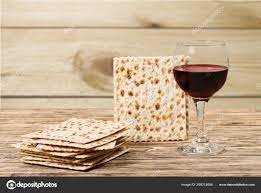The Matzoh and the Cup
How does Passover relate to the Lord’s Supper? With Passover, Good Friday, and Resurrection Day coming up, it would be good to remember how the Last Seder relates to the Lord’s table. What is the significance of the Lord’s Supper?
Although some people interpret the Lord’s Supper as a means of God’s grace with the mystical presence of the Lord Jesus in the elements, I believe the Bible teaches that it is a memorial and symbolic meal. As for the memorial aspect, it is essential to recognize that the Lord Jesus inaugurated the Lord’s table at a Passover meal. Therefore, it should be understood in a similar way. Scripture says that Passover was “to be a memorial for you [Israel], and you must celebrate it as a festival to the Lord” (Exod. 12:14 HCSB). Similarly, the Lord Jesus would tell His followers that when they celebrate communion, they do so “in remembrance of” Him (Luke 22:19; 1 Cor. 11:24). So the Lord’s supper was intended to memorialize our redemption from sin by remembering the body and blood of the Messiah Jesus.
With regard to the symbolic nature of the elements, we should recall once again that the Lord Jesus inaugurated communion at a Passover meal, called the Seder. By the New Testament era, Jewish people had developed all sorts of symbolic elements to be included the Passover Seder, such as a bitter root which represented the bitterness of slavery and a bowl of salt water representing the tears of slavery (Exod. 12:8; Num. 9:11). So, when the Lord Jesus said that the bread and wine were His body and blood, none of those present would have understood these words in a literal sense. As Jewish people, the disciples would have been familiar with the symbolic elements of Passover. Therefore, they would have recognized that the Lord Jesus was using a metaphor, meaning, “This bread is a symbol of my body and this cup is a symbol of my blood.” The Lord’s Supper, celebrated as a symbolic memorial, remains a crucial outward celebration of the New Covenant.
However, if the Lord’s Table is only a symbolic memorial, some wonder if the specific elements are all that important. Would it be okay to observe communion with potato chips and soda pop? It must be remembered that these symbols have specific and important meanings. The Lord Jesus chose unleavened bread and the fruit of the vine to institute this ceremony because they represent His sacrifice. He used matzoh (unleavened bread eaten at Passover) for several reasons. First, matzoh was significant because leaven (yeast) in Scripture is frequently used as a symbol for sin. The Lord Jesus warned of the “leaven of the Pharisees” (hypocrisy) and “the leaven of the Sadducees” (unbelief) (Matt. 16:6). Paul urged the Corinthians to clean out “the leaven of malice and wickedness” (1 Cor. 5:8). So, the unleavened bread represents the sinlessness of the Lord Jesus.
Second, ancient (and modern) matzoh was pierced in straight lines to keep it from rising. This symbolized that the Lord Jesus “was pierced through for our transgressions” and “by His scourging we are healed” (Isa. 53:5). Potato chips, fluffy loaves of bread, or even unleavened communion wafers miss the important symbolism of celebrating the Lord’s supper with matzoh.
Additionally, the wine used during a Passover meal is a deep red and represents the blood of the Messiah Jesus that cleanses us from sin (Heb. 9:14). So soft drinks or even white wine or white grape juice are inadequate in representing His blood. For the cup to communicate its symbol, we need to use red fruit of the vine, whether juice or wine.
The symbolic nature of the Lord’s Supper doesn’t minimize its importance any more that the God ordained Passover celebration diminished God’s deliverance of Israel from Egypt. We must observe it regularly because: (1) The Lord Jesus commanded that we observe it (“Do this in remembrance of me,” Luke 22:19; 1 Cor. 11:24); (2) The Lord’s Table is a proclamation of our faith that the Lord Jesus died as our substitute, that He will return, and implicitly that He is alive because the resurrection is necessary for His return (“you proclaim the Lord’s death until He comes,” 1 Cor. 11:26); and (3) The Lord’s Supper is a declaration of the fellowship of all believers because by it we share our unity in the Messiah Jesus (“Is not the cup . . . a sharing in the blood of Messiah? Is not the bread . . . a sharing in the body of Messiah? . . . we who are many are one body;” 1 Cor. 10:16-17). The Lord’s Supper remains a crucial celebration—its value and importance is in no way diminished by viewing it as symbolic.
While some people call communion a sacrament (a grace giving practice) and others an ordinance (an observance commanded by the Lord), I prefer to call it a New Covenant ceremony. Ceremonies are designed to communicate a truth by our actions. Every time we celebrate the Lord’s Supper, we are declaring that the Lord Jesus died for us, rose again, and is returning as our King. Observing the Lord’s Table is a living declaration of the Good News that saved us from our sin. This blog post is adapted from question 47 of my recent book, 50 Most Important Bible Questions (Moody Publisher, 2022).
